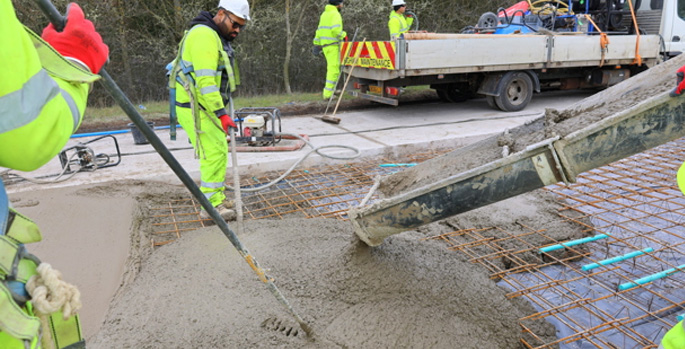National Highways has completed essential repairs, which began this February, to a concrete section of the M54, meaning that two scheduled weekend closures are no longer needed.
Eight full weekend closures were originally scheduled – including over the Easter bank holiday weekend – to allow for the works to take place between junctions 2 and 4, but National Highways said that the contractors had made ‘swift progress’ and were able to complete the work using only six of the closures, and without impacting on the bank holiday.
Concrete roads, which were built primarily in the 1960s and 70s, make up roughly 400 miles (4%) of England’s strategic road network. The concrete slabs they are comprised of are more durable than asphalt, but after multiple decades of use, they are now nearing the end of their lifespan and need specialist repairs to ensure their continued use.
National Highways project manager Dan Bothwick said: ‘We always try to minimise disruption wherever possible and only close the road if we really have to, for the safety of both our workforce and road users.
‘So we are delighted that we have been able to reduce the number of weekend closures, and the impact on road users, and that we could finish off some works overnight when we know roads are quieter.
‘In fact, we actually carried out more repairs than anticipated as we discovered additional areas of the carriageway that needed attention once the scheme got under way. Drivers can now enjoy smoother, and safer, journeys along the M54.’
Highways manager Adrian Pike from contractor Concrete Repairs Limited (CRL), which headed up the project, said: ‘CRL were involved in the scheme several months before the works began and carried out detailed Early Contractor involvement (ECI). This really helped with the planning, sequencing and methodology particularly regarding the traffic management and phasing/resourcing of each activity.
‘We employed a public liaison officer who helped to ensure that whilst disruption was inevitable over the weekends, information about the works and diversion routes was given at an early stage.
‘The team worked really well and it is a credit to all those involved that the scheme completed ahead of schedule minimising the impact to the travelling public, local businesses and other stakeholders.’






